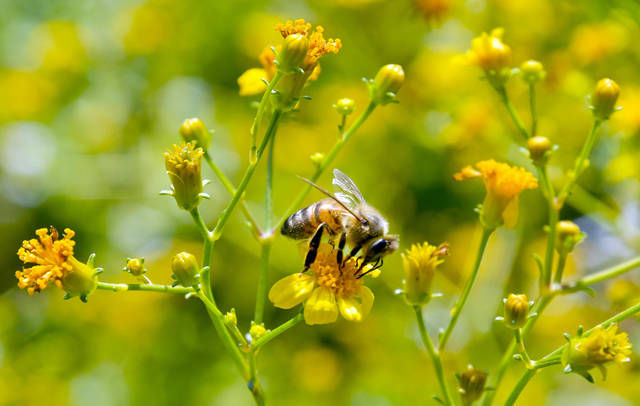LIHUE — Kauai’s honeybees are blooming. That’s according to Scott Enright, chairman of the Hawaii Board of Agriculture. “Kauai has some of the healthiest bees in the world. That’s the conclusion of our apiary specialist,” he said. The conclusion was
LIHUE — Kauai’s honeybees are blooming.
That’s according to Scott Enright, chairman of the Hawaii Board of Agriculture.
“Kauai has some of the healthiest bees in the world. That’s the conclusion of our apiary specialist,” he said.
The conclusion was made after studying factors like year-round forging and a high level of honey production, Enright added.
Enright spoke to the Economic Development and Intergovernmental Relations Committee on Wednesday to discuss the results of the state’s bee pollen study.
“There was community concern about agriculture pesticide use, specifically on the Westside of Kauai, and whether bees were being adversely effected by those practices and were being killed off,” he said. “This study shows this is not the case.”
The study convened in 2014. That same year, the Kauai County Council passed a resolution to establish a $12,000 grant within the Office of Economic Development, which would allow beekeepers to test pollen for the presence of pesticides and other threats.
“We’ve done the pollen sample. There were 23 sites spread from Haena to Kekaha that we surveyed, with 200 individual samples,” he said.
The pollen samples were not tested for glyphosate, a pesticide found in Round-Up, Enright said.
While chemicals like fipronil, which are found in pest control products, were found in every sample, it is not enough to worry about. Rather, the state is curious to know how those chemicals got into the pollen, Enright said.
“They’re not high concentrations, but that’s what we’re finding,” he said. “The pesticide branch, the state Department of Health toxicologist, all took a look at this. They’re not concerned about the levels, but understanding the pathways would be interesting.”
Additionally, those chemicals were found in beehives around the world, Enright said.
To find chemicals in every sample is unfortunate, said James Trujillo, chairman of the Kauai Beekeeper’s Association.
“That’s not something we’d like to continue to see in our results,” he said. “What can we do to protect our bees and the livelihood of our beekeepers? We are prepared to find out.”
The state’s Bee Pollen Study was completed last year, and a report is expected to be released soon. But as a part of the conditions for the study, the specific findings are confidential — only the individual beekeeper is privy to the information, said George Costa, director of Economic Development.
“We will get a final report, which will contain the general condition of the bees and beehive, the general location of where they tested and no beekeeper names will be part of the final report,” he said.
Beekeepers wanted the results to remain confidential because they were worried they could lose business, Trujillo said.
There was concern they could no longer say their product was organic, added Carl Berg, a Kauai-based scientist and chair of the Surfrider Foundation, who helped draft the confidentiality statement.
Mel Rapozo, council chair, said because the county funded the study, it should be allowed to see the results.
“Confidentiality would be left to us,” he said.
Rapozo said he plans to follow up with a formal request for the complete report.
At about the same time the Bee Pollen Study was going on, Berg embarked on an independent study, researching the levels of glyphosate in honey.
“The purpose of my study was not to see the effects on the bees. The goal was more to see if there was a migration of all these pesticides we use in our gardens,” he said.
Berg said he found glyphosate in about 37 percent of the 59 hives he tested.
Berg’s study and Enright’s presentation bring up two different issues, Rapozo said.
“The study we paid for was done on pollen. Surfrider’s was done on honey. There were different results,” he said. “I would think and hope the state would consider looking at doing a study on the honey.”
If pesticides are being found in honey, that needs to be addressed. But at the right level, said Councilman Ross Kagawa.
“If Round-Up is in honey, it’s valid and we need to check it out. But that needs to be going through the proper level,” he said. “The federal government should be the target. You look with the proper sources that have the jurisdiction and expertise.”




